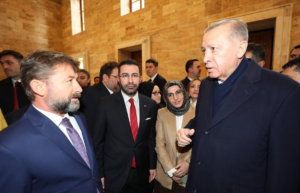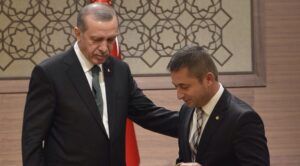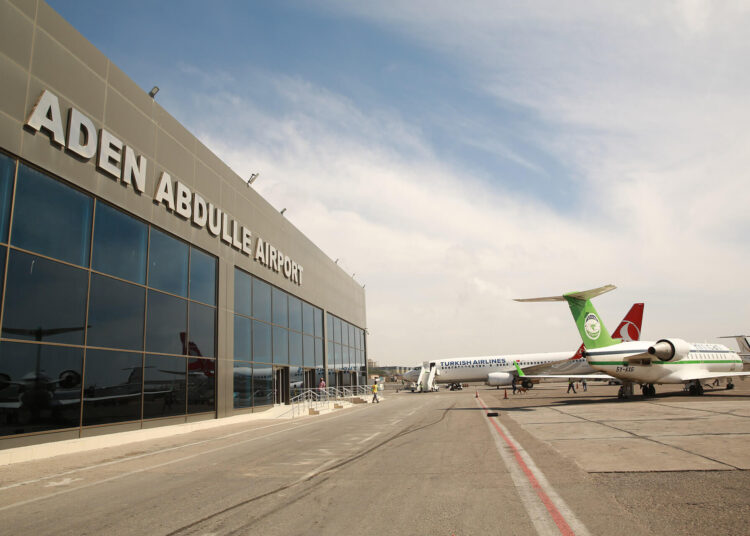Abdulah Bozkurt/Stockholm
A Turkish company controversially awarded the management of Somalia’s international airport through a questionable contract and seemingly involving Turkish President Recep Tayyip Erdogan has long been shielded from scrutiny despite facing allegations of corruption, labor exploitation, sexual harassment and abuse of authority.
The company’s impunity was most recently evident when a senior executive, arrested on charges of sexual harassment and mistreatment of Somali employees in September, was released and the criminal case was quietly suppressed.
The case came to light in September when Ertuğrul Karaferiyeli, the human resources manager of Turkey’s Favori LLC airport management and ground handling firm, which has managed Mogadishu’s Aden Abdulle International Airport since 2013, was detained on September 17 over allegations of serious misconduct, including sexual harassment, threats, abuse of power and violations of labor laws in relation to Somali employees.
Karaferiyeli had been under investigation by the Office of the Attorney General in Somalia for an extended period before his arrest, with the Banadir Regional Court ultimately approving a detention order after reviewing evidence presented by prosecutors.
The arrest of the Turkish executive sent shockwaves through the Turkish government, which had facilitated the award of Mogadishu airport operations to Favori, which has close ties to Turkish President Erdogan. Following a flurry of communications and negotiations between Turkish and Somali officials, Karaferiyeli was released on October 2, behind-the-scenes discussions reportedly led to the victim’s family agreeing to withdraw their complaint in exchange for a $20,000 out-of-court settlement.

Karaferiyeli spent years working for Turkey’s national flag carrier, Turkish Airlines, where he served as the chief of VIP customers among other positions, before transitioning to Favori, a company operating under the umbrella of Turkey’s Kozuva Group.
Favori, managed by the Kozuva family, had no prior experience in airport management before being generously awarded a 20-year contract to operate the Mogadishu airport. Based in Turkey’s industrial city of Çerkezköy, the family has cultivated close ties with President Erdogan’s ruling Justice and Development Party (AKP) over the years.
Mustafa Kozuva serves as the chairman of the board of directors at the Kozuva Group of Companies, with his younger brother Süleyman Kozuva acting as his deputy. Two more brothers, Emre and Sinan Kozuva, also hold positions as board members. Süleyman, frequently seen alongside Turkish President Erdogan, ran an unsuccessful campaign for mayor of Çerkezköy under the AKP ticket in the 2019 local elections.
President Erdogan personally attended the inauguration of a section of Somalia’s Mogadishu airport in 2015 and awarded the operation rights for Turkey’s Çukurova Airport in Adana for 25 years to the same group in 2020.

The history of Favori exemplifies how a small firm can rapidly transform into a major corporation through the backing of Turkish President Erdogan, who leveraged his political influence to enrich the company and its owners beyond their wildest aspirations.
Favori began as a small company, originally established in December 2005 under the name Favori Grup İnşaat Malzemeleri Mobilya Sanayi ve Ticaret Limited Şirketi (Favori Group Construction Materials Furniture Industry and Trade Limited Company) by Süleyman Kozuva and two business associates, focusing on the sale of construction materials with an initial capital of approximately $300,000.
Over time, Kozuva brought his three brothers into the business, transforming it into a family-controlled enterprise. The company had no prior involvement in airport or ground management services.
After signing a contract to manage the Mogadishu airport, Favori quickly changed its name and added airport management and fuel trade as new business activities in its official trade registration in Turkey:
Though its official business registry did not authorize Favori to operate, build or develop airports or to engage in the purchase or sale of jet fuel, the company nonetheless signed a contract on January 9, 2013, with Somalia’s federal government, represented by the Minister of Information, Post, Telecommunication and Transportation, to undertake the renovation and daily operations of Mogadishu’s Aden Abdulle International Airport.
The current owners of Favori, according to Turkey’s trade registry records, are four brothers: Mustafa, Süleyman, Emre and Sinan Kozuva:
Under normal circumstances, a company with no experience in the aviation or airport management industry would have no prospect of securing such a contract. Moreover, trade registry records offered no indication that the company intended to expand its business activities into the aviation sector in the future.
However, it appears the deal was brokered at a political level, with President Erdogan urging Somali authorities to award the contract to a company he personally selected, despite its failure to meet any qualification or eligibility requirements.
It remains unclear what Erdogan gained in return for brokering such a deal. However, based on his involvement in similar arrangements in the past, Erdogan often demands cash kickbacks to bolster his multi-billion-dollar wealth or solicits donations for front foundations managed by his family members.

After signing the contract, Favori quickly made several changes to give the deal the appearance of legitimacy. Just one day after securing the agreement with the Somali government, the company’s owners convened a board meeting to rename the company and add airport management and fuel trade to its official business activities. The company’s name was changed to Favori İşletmecilik Yurtdışı Yatırım İnşaat Sanayi ve Ticaret Limited Şirketi (Favori Management and Overseas Investment Construction Industry and Trade Limited Company).
Favori’s changes to its name and business activities were publicly announced in the official trade records publication, Ticaret Sicili newspaper, on January 16, 2013. The company and Somali officials then amended the contract to reflect the new name on January 20, 2013.
This suggests that the grant of the contract had been secured at the political level with President Erdogan’s involvement and the necessary changes were hurriedly implemented after the signing to make Favori appear qualified to enter into such an agreement.
In October 2020, the company was reorganized from a limited liability company to a corporation and changed its name again to Favori İşletmecilik Anonim Şirketi (Favori Management Corporation). A year later, it relocated its headquarters to Istanbul.
A UN report questioning the contract awarded to the Turkish firm Favori for the management of the Mogadishu airport:
The controversial contract with Favori attracted the attention of a United Nations panel of experts, the Monitoring Group on Somalia and Eritrea, which reports to the UN Security Council. According to a report issued in October 2016 by the UN group, it was “a technically poor deal for the FGS [federal government of Somalia] and a case of potential abuse by a private entity” and highlighted concerns about the share of revenue awarded to the Somali government.
According to the contract, Favori, which is obligated to rebuild the airport’s infrastructure and construct a new terminal at its own expense, is allowed to deduct all costs from future airport revenues. However, the agreement lacks a clear and agreed-upon mechanism for assessing the actual cost of the investment.
Favori receives 55 percent of the net revenue generated by airport management, while the Somali government receives the remaining 45 percent. The arrangement creates a potential issue because in the absence of technically precise terms and processes, Favori could inflate expenses, thereby reducing the government’s share of the net revenue.
According to the UN panel, Favori has been deducting salary taxes as expenses and utilizing a depreciation deduction of up to $300,000 per month. These practices were neither initially identified nor agreed upon with the Somali government.

For example, in the financial report submitted by Favori to the government, the total revenue generated in June 2016 was $1.2 million, while total expenses amounted to just over $600,000. The same report revealed that $300,000 of the expenses were attributed to a depreciation deduction. As a result, only $250,000 was transferred to the government as revenue.
In August 2024, Somalia’s Auditor General Ahmed Issa Gutale accused Favori of failing to submit the required financial reports following independent audits. Gutale stated that this failure has made it impossible for the government to verify its rightful share of the revenue generated from Favori’s operations.
The revenue obtained by the government from Favori during the 2022 financial year amounted to $3.1 million, significantly below the projections made by the government’s financial advisors.
A dispute also arose over the collection of navigation fees, which the Somali Civil Aviation Authority claims it has the right to collect. Without addressing the allegations raised by Gutale, Favori issued a written statement asserting that it has the right to collect navigation fees as outlined in the 2013 contract.
The abuse of workers by Favori managers in Mogadishu also sparked outrage from the Federation of Somali Trade Unions (FESTU), which accused the company of egregious labor rights violations, including non-payment of wages, unsafe working conditions and poverty-level pay. Favori employs baggage handlers, drivers, security personnel, cleaners and check-in staff, many of whom have reported a troubling lack of basic worker protections.
According to FESTU, workers at Favori face abrupt dismissals without explanation or adherence to Somalia’s labor code, which mandates clear termination procedures. In addition, employees are subjected to excessive work hours, often from 7 a.m. to 6 p.m., violating the law that limits work to 8 hours per day. More than 50 workers confirmed they did not receive overtime pay, a violation further compounded by the absence of basic compensations such as food and transport.
Somali union report highlighting abuse by Favori management in Mogadishu:
Chronic exhaustion affects many workers, as Favori fails to provide the mandatory weekly rest days required by the labor code. Poor health and safety conditions are further compounded by the company’s failure to maintain medical staff or facilities, leaving employees vulnerable to additional risks.
Workers injured on duty report being denied immediate medical care or adequate compensation. One worker revealed that even after a broken hand, they were forced to continue working, demonstrating blatant disregard for human dignity guaranteed under the Somali constitution.
Favori’s wages, ranging from $200 to $300 per month, leave workers struggling to meet basic needs. Despite the high cost of living in Somalia, these wages remain stagnant. What is more, workers performing identical tasks are paid unequally based on nationality, with Somali workers earning significantly less than their Kenyan and Turkish counterparts.
The absence of promotion opportunities and arbitrary salary deductions further fuels discontent among employees. One worker lamented, “It’s like I’m working for this company almost for free.”
Favori has systematically stifled workers’ attempts to organize, denying employees their right to collective bargaining. Those who speak out risk termination or intimidation. In doing so, the company directly violates international labor standards and treaties ratified by both Somalia and Turkey, including the International Labour Organization’s conventions on freedom of association and collective bargaining.
Workers allege that some Somali government officials shield Favori from accountability, with reports suggesting that the company offers kickbacks, business-class tickets and other benefits to high-ranking officials, thereby undermining labor rights enforcement. A Ministry of Labour and Social Affairs investigation found that Favori’s contracts do not comply with Somali labor laws. However, interference from the Minister of Justice has reportedly stalled efforts to enforce compliance.
Given Turkey’s extensive involvement in Somali affairs, ranging from large-scale military aid and troop training to providing millions of dollars in grants, it is unlikely that Somali authorities can hold Turkish corporations such as Favori accountable for their controversial business practices within Somali territory.












